You just crashed your car, and now you’re wondering where to go after a car accident for the right medical care. Many car accident injuries don’t show up right away, which means you might feel fine now but hurt later.
This guide breaks down exactly when to head to the emergency room, when urgent care works best, and when to call 911 so you get the help you need fast. Your health depends on making the right choice.
Key Takeaways
Call 911 immediately for life-threatening injuries like severe bleeding, breathing problems, loss of consciousness, or inability to move.
Visit emergency rooms for traumatic brain injuries, spinal damage, broken bones, or any symptoms involving chest pain and numbness.
Choose urgent care for minor cuts, whiplash, mild fractures, and muscle strains that need attention but aren’t emergencies.
Adrenaline masks pain after crashes, so many car accident injuries don’t show symptoms for hours or days later.
Document all medical treatments, follow-up appointments, and injury photos to support insurance claims and ensure proper recovery monitoring.
Table of Contents
How can I tell how serious my injuries are?

Car accident injuries can fool you at first. Adrenaline masks pain, and some symptoms take hours or days to show up. Check yourself for obvious signs like heavy bleeding, broken bones sticking out, or severe burns.
Look for trouble breathing, chest pain, or numbness in your arms and legs. Head injuries are tricky because brain damage doesn’t always cause immediate symptoms. Loss of consciousness, even for a few seconds, means you need emergency medical assistance right away.
Your body might feel fine after a motor vehicle accident, but internal injuries can be serious. Spinal injuries often cause tingling or weakness that gets worse over time. Traumatic brain injury symptoms include confusion, dizziness, or severe headaches.
Symptoms of car accident injuries may not surface immediately; seek evaluation if unsure of injury severity.
Chest discomfort could signal heart problems or internal bleeding. Don’t wait if you feel dizzy, nauseous, or have vision problems. These signs point to head trauma that needs immediate care from medical professionals.
A car accident lawyer can help you understand your rights while you focus on getting proper medical treatment.
When should I go to the emergency room?
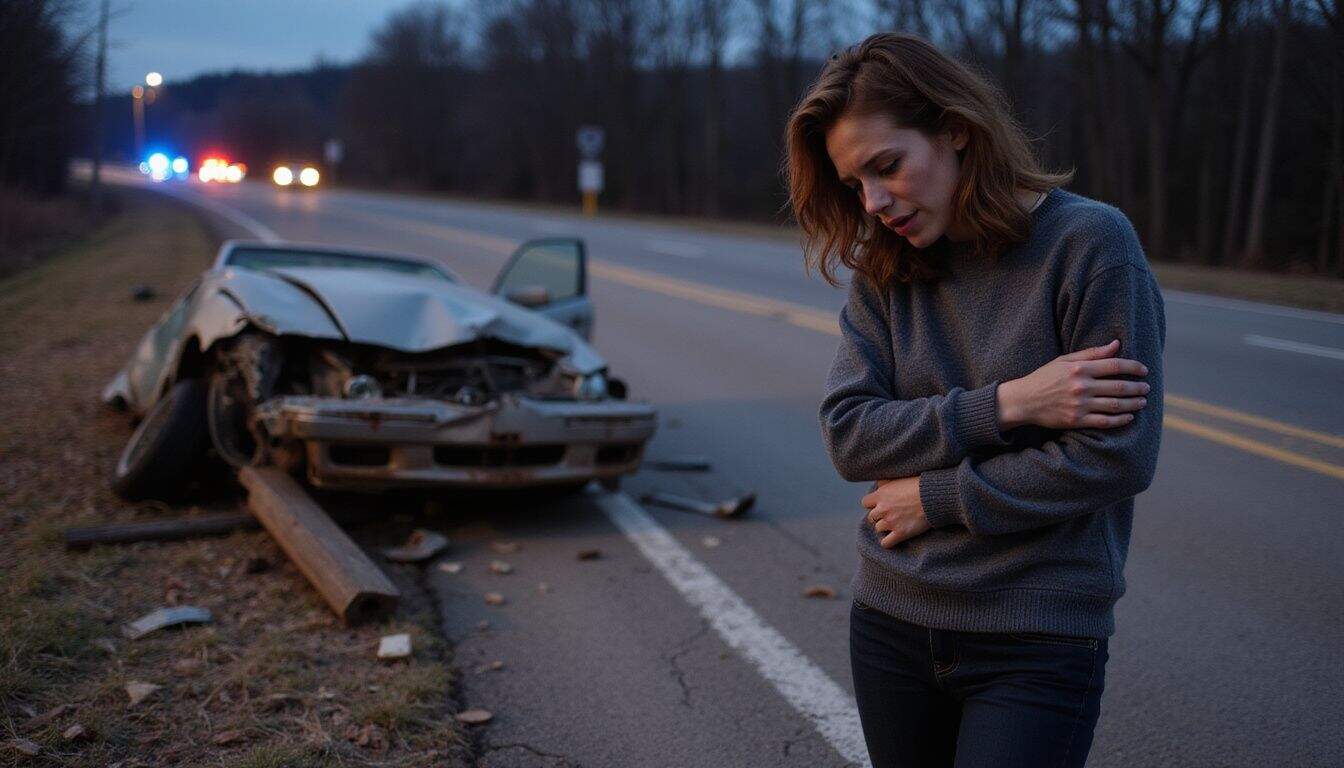
Your body sends clear signals after a car crash, and some demand immediate emergency room attention. Life-threatening injuries like severe bleeding, breathing problems, or suspected spinal damage require urgent medical care at the nearest hospital emergency room.
What are signs of heavy bleeding or loss of consciousness?
Heavy bleeding shows several clear warning signs that demand immediate medical attention. Excessive blood loss from any wound creates a serious emergency situation. Blood pooling around the accident scene or spurting from cuts indicates severe injury.
These symptoms point to damage that urgent care centers cannot handle alone.
Loss of consciousness signals potentially life-threatening conditions like traumatic brain injury or shock. Dizziness, confusion, or sudden weakness often come before someone passes out.
Emergency rooms must evaluate these symptoms right away. Car accident injuries involving the head or spine create the highest risk for consciousness problems. Both heavy bleeding and loss of consciousness require emergency room care, not just urgent care facilities.
How do I know if I have difficulty breathing or broken bones?

Difficulty breathing shows up as chest tightness, shortness of breath, or gasping for air. You might feel like you can’t get enough oxygen, even when sitting still. Your chest may hurt when you try to take deep breaths.
These symptoms need immediate attention at an emergency room because they signal serious internal injuries. Don’t wait to see if breathing problems get better on their own.
Broken bones create severe pain that gets worse when you move the injured area. You’ll notice swelling, bruising, and the bone might look bent or out of place. The affected area feels tender to touch, and you can’t use it normally.
Sometimes you’ll hear a cracking sound when the injury happens. Symptoms of a broken bone include severe pain, swelling, and deformity in the affected area, making an ER visit necessary.
If you suspect a fracture, get medical help right away because untreated breaks can cause permanent damage.
Persistent symptoms after a car accident should be monitored, as injuries may not be immediately visible.
What are severe head or spinal injury symptoms?

Severe head injuries cause loss of consciousness, confusion, severe headaches, and persistent vomiting. Your brain may feel foggy, and you could have difficulty recalling basic information.
Traumatic brain injury symptoms also include dizziness, slurred speech, and extreme sensitivity to light or sound. These signs indicate your brain has suffered serious damage that requires immediate emergency room care.
Spinal injury symptoms include numbness, tingling in extremities, weakness, and loss of bowel or bladder control. You might experience sharp pain shooting down your arms or legs, or complete inability to move certain body parts.
Back injuries from car accidents can cause permanent paralysis if not treated promptly. Any loss of feeling below the crash site on your body indicates potential spinal cord damage that requires urgent medical attention.
When is urgent care the right choice?

Urgent care facilities offer the perfect middle ground for car accident injuries that need attention but aren’t life-threatening emergencies, making them ideal for those bumps, bruises, and aches that can’t wait for your regular doctor’s appointment.
Can minor cuts, scrapes, or whiplash be treated at urgent care?
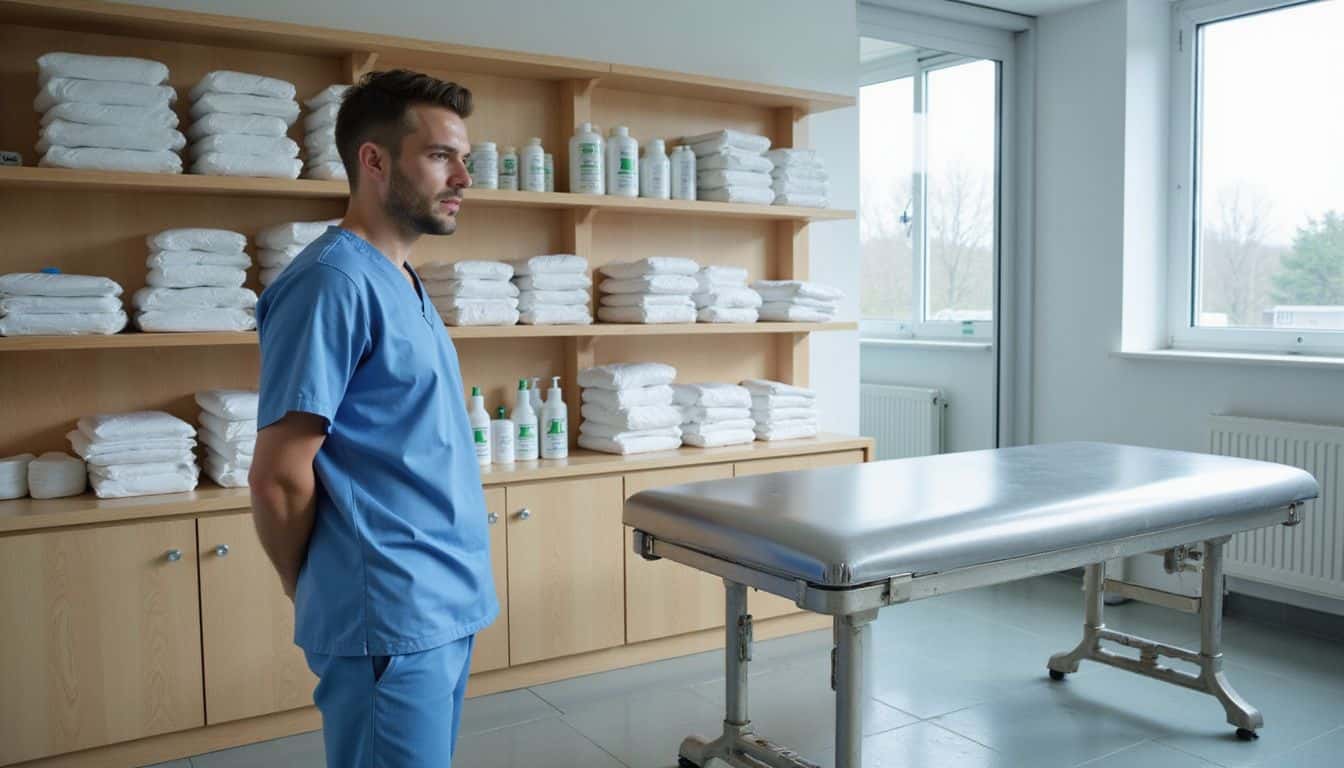
Minor cuts, scrapes, and whiplash symptoms can be treated at urgent care facilities. These care facilities handle non-life-threatening injuries effectively. Urgent care clinics provide services like X-rays, stitches, and splints for injury treatment.
Nurses and physicians at these locations treat sprains and strains too. Your general practitioner might not be available after hours, making urgent care the right choice. These facilities have shorter wait times and lower costs compared to emergency rooms.
https://www.youtube.com/watch?v=OOMn5RgVftc
Car accident injuries like mild concussions also get proper care at urgent care centers. Physical therapists work with these facilities to help patients recover. The medical facility can apply dressings to wounds and check for signs of infection.
Most urgent care locations accept health insurance, which helps with costs. Your insurance company will likely cover treatment for personal injuries at these centers. The medical condition gets documented properly for any future insurance claim needs.
How do I identify mild fractures or muscle strains?
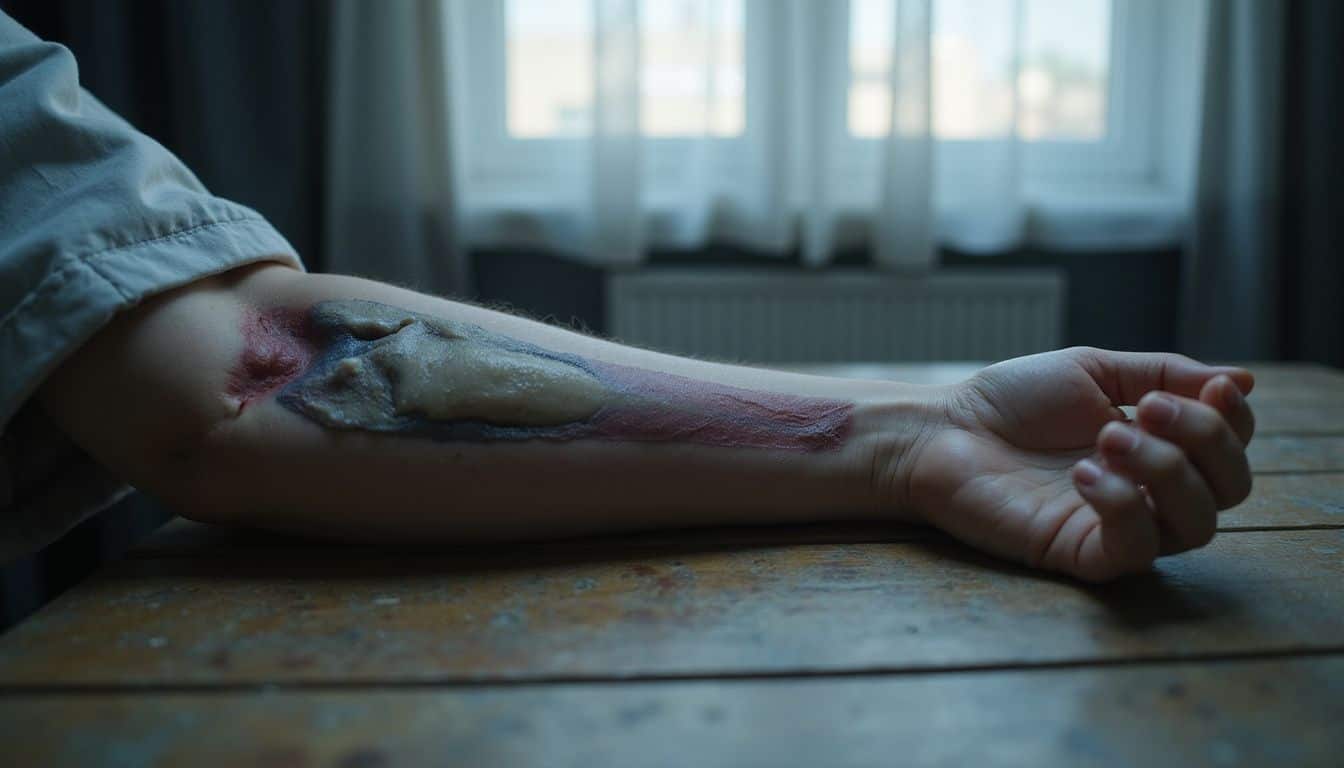
Mild fractures show clear warning signs that you can spot right away. Localized pain hits the injured area hard, and swelling appears within hours of the car accident. Bruising develops around the fracture site, making movement painful and difficult.
Your body tells you something is wrong when you can’t move the affected area normally. These car accident injuries need urgent care attention, even if they seem minor at first.
Muscle strains create different symptoms that are just as important to recognize. Pain shoots through the injured muscle, followed by muscle spasms that can catch you off guard. Swelling builds up in the strained area, and your mobility becomes limited.
I’ve seen guys tough it out after a car wreck, thinking they’re fine, only to discover serious sprains and strains later. Timely medical evaluation saves you from chronic pain down the road because symptoms might not show up immediately after the injury.
The body’s initial response to trauma can mask the true extent of injuries, making early medical assessment crucial for proper healing.
When should I seek care outside regular doctor hours?
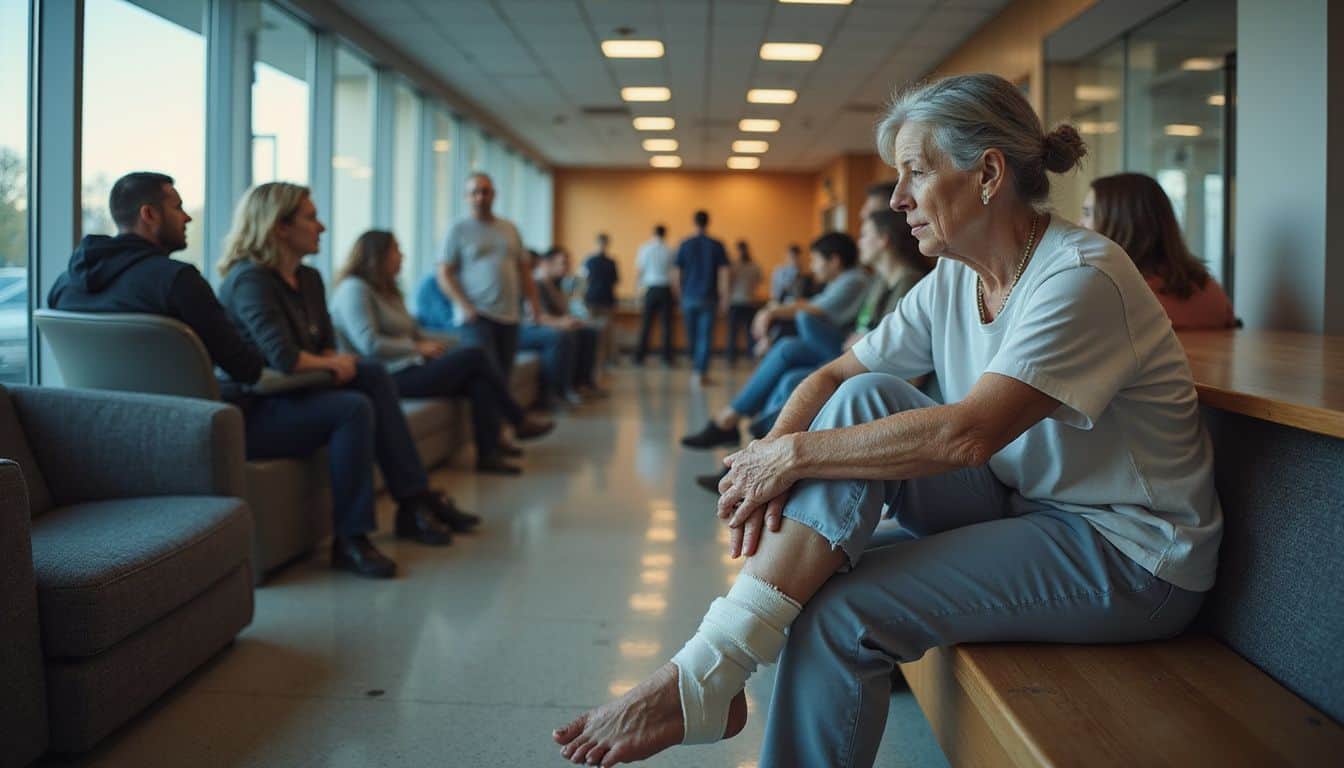
Your regular doctor’s office closes at 5 PM, but car accident injuries don’t follow business hours. Urgent care facilities fill this gap perfectly, staying open evenings and weekends to handle non-life-threatening injuries.
These facilities typically offer wait times of just 15-20 minutes, making them ideal for sprains and strains, minor cuts, or mild concussions that need attention but can’t wait until Monday morning.
Last year, I twisted my ankle badly in a weekend fender-bender and couldn’t walk properly. My primary care physician wasn’t available until Tuesday, but the urgent care facility down the street took great care of me Saturday evening.
They handled my sprain with rest, ice, compression, and elevation treatment, plus gave me crutches and a follow-up plan. This type of care facility works best for injuries that hurt but won’t kill you, saving emergency room visits for truly serious situations.
When should I call 911 after a car accident?

Some car accident injuries demand immediate emergency response, and knowing when to dial 911 can save your life. If you can’t move, feel crushing chest pain, or notice severe bleeding that won’t stop, emergency services need to reach you fast.
What counts as a life-threatening injury or inability to move?
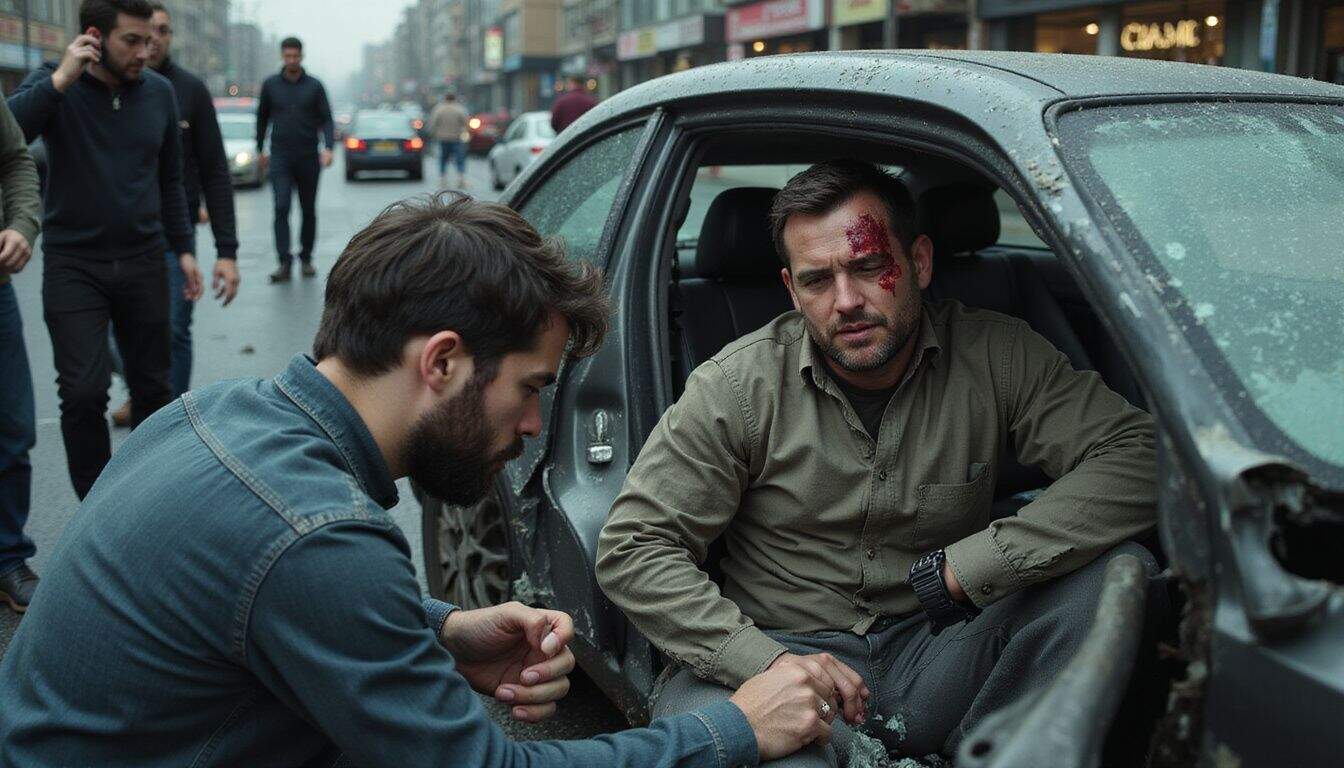
Life-threatening injuries after a car accident include severe head trauma, significant bleeding, and spinal injuries that affect your ability to move. Traumatic brain injury symptoms like confusion, loss of consciousness, or difficulty breathing demand immediate emergency room attention.
Visible limb deformities, severe burns, or any inability to move your arms or legs signal serious conditions that could involve fractures or spinal cord damage. Heart attack symptoms, such as chest pain or shortness of breath, can also occur from the shock of an accident.
An inability to move may indicate critical spinal cord damage or multiple fractures that require surgical intervention. Severe pain combined with visible bone deformities suggests joint dislocations or broken bones that need immediate medical care.
Heavy bleeding that won’t stop, second-degree burns covering large areas, or any loss of feeling in your limbs counts as emergency situations. These conditions can worsen quickly without prompt medical attention, so calling 911 becomes essential for your survival and recovery.
What should I do after getting medical care?

Getting medical care after a car accident is just the beginning of your recovery process, and what you do next can make or break your insurance claim and long-term health outcomes.
Why are follow-up appointments and treatment plans important?

Follow-up appointments serve as your safety net after a car accident. Healthcare providers monitor your recovery progress and catch complications before they become serious problems.
Treatment plans outline the specific therapies you need, from physical therapy sessions to pain management strategies. These appointments allow doctors to adjust your care based on how you’re healing, ensuring you get back to full strength.
Proper documentation during these visits supports your insurance claim and protects your financial interests. Your doctor records each symptom, tracks your improvement, and notes any setbacks that occur.
This medical record becomes crucial evidence when dealing with your insurer or insurance adjuster. Skipping follow-ups can lead to long-term complications like chronic pain or reduced mobility, problems that could have been prevented with continuous rehabilitation and proper medical oversight.
How do I document the accident and my injuries?
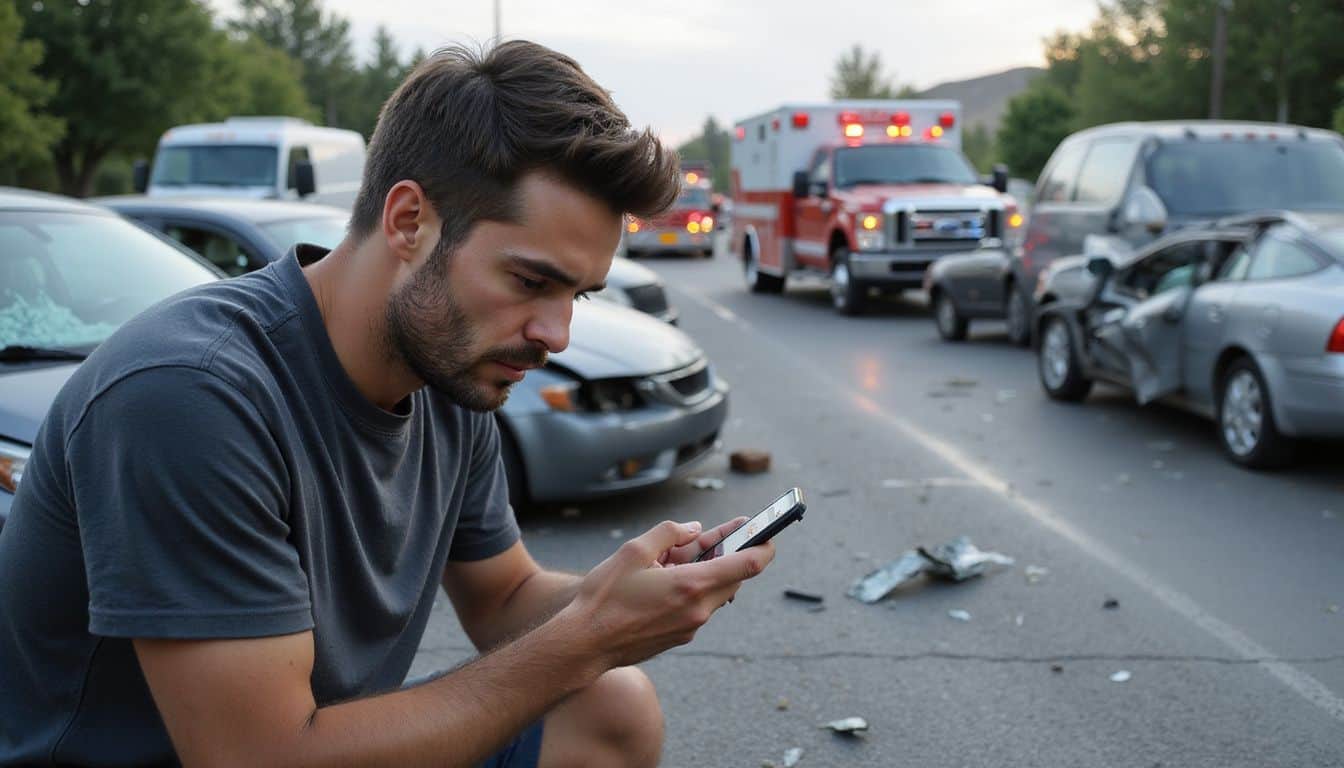
Follow-up appointments keep your recovery on track, but proper documentation protects your legal and financial interests. Take photos and videos of the accident scene, damages, and injuries right after the crash happens.
Capture multiple angles of vehicle damage, street conditions, and any visible injuries on your body. Collect contact information from witnesses who saw what happened. Make sure a police report gets filed and obtain a copy or report number from the responding officer.
Maintain a detailed record of all medical treatments and healthcare communications you receive. Write down every doctor visit, emergency room trip, and conversation with medical staff.
Keep copies of medical bills, CT scans, and treatment records in one organized file. Document your pain levels, symptoms, and how injuries affect your daily activities. Take photos of bruises, cuts, and other visible injuries as they heal.
Notify your insurance company with all necessary documentation, including photos, medical records, and the police report number.
How Will Car Accident Medical Care Change in 2025?
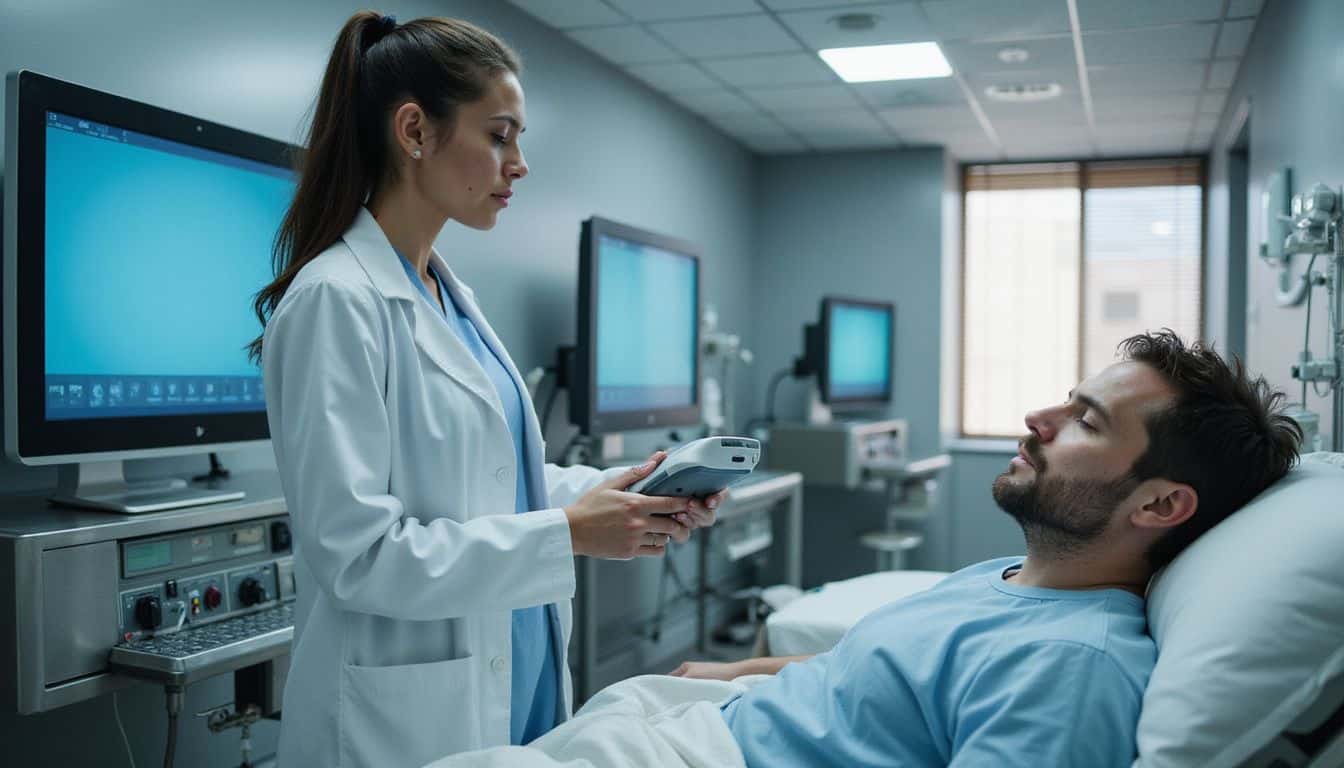
Medical technology is advancing fast, and car accident care will look different in 2025. Doctors will use better diagnostic tools to spot traumatic brain injuries and spinal problems right away.
CT scans will become faster and more accurate. Emergency rooms will have new equipment that helps doctors see inside your body more clearly. Telemedicine will let you talk to doctors from home after minor crashes.
Your phone might even connect you to medical experts while you’re still at the accident scene. These changes mean faster treatment and better outcomes for car accident injuries.
Emergency management systems will work smarter in 2025. Hospitals will share information instantly with insurance agencies and auto insurance companies. This means less paperwork for you and faster insurance claims.
Doctors will have access to your complete medical histories right away. They’ll know about your past illnesses and surgeries before you even arrive. Chiropractic care and spinal adjustments will use new methods to fix herniated disks.
Pain and suffering treatment will improve with better technology. Having experienced a car accident myself, I know how confusing the medical process can be, but understanding where car accidents happen most frequently helps doctors prepare better treatment plans for different types of crashes.
People Also Ask
Should I go to the emergency room (ER) after a car accident?
Yes, visit the emergency room immediately if you have life-threatening injuries like severe burns, traumatic brain injury, or need intensive care. For non-life-threatening injuries such as minor burns or sprains and strains, urgent care might be sufficient.
What medical tests might I need after a car accident?
Doctors often order CT scans to check for internal injuries, especially if you hit your head. The triage team will decide which tests you need based on your car accident injuries.
How do car accident injuries affect my insurance claim?
Document all your injuries and medical visits for your insurance claim. Contact your car insurance company, like Geico insurance, and speak with insurance agents about coverage. Your insurance agency needs medical records to process personal injury claims properly.
When should I schedule follow-up check-ups after my accident?
Schedule check-ups within a week of your car accident, even if you feel fine. Some injuries don’t show symptoms right away, and regular monitoring helps catch problems early.
What if my injuries require surgery or cause scarring?
Serious injuries may need surgery or leave permanent scarring. Work with your medical team on treatment plans, and make sure your professional liability coverage through your insurance handles these costs. The disease control guidelines also recommend proper wound care to prevent infection.

